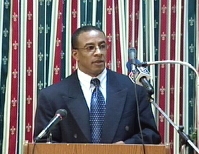| |
Contact:
Primus Hutchinson
 |
|
Minister for Agriculture, Forestry and
Fisheries - Hon. Ignatius Jean |
Friday, March 19, 2004 - St. Lucia has started the process of becoming
part of the international convention on Persistent Organic Pollutants (POPS), by
participating in the development and implementation of a global approach to the
management of chemicals. That announcement was made yesterday, during a one-day
Project Launch and Inception Workshop on POPS at the Bay Gardens Hotel.
Chief Sustainable and environment Officer in the Ministry of Physical
Development, Environment and Housing, Bishnu Tulsie says, today, the challenge
facing nations and particularly, small-island states like St. Lucia is to
develop the capacity to manage chemicals in a manner that will not impact
negatively on human health and the environment. According to Mr. Tulsie, this
initiative is taken against the backdrop of the advantages of chemicals in
everyday living and additionally, its possible negative impact.
Mr. Tulsie says the Government of St. Lucia has already consented to these
international environmental agreements and the process represents the beginning
of an attempt to meet with those obligations in order meet St. Lucia’s
obligations under the Stockholm Convention.
Minister for Agriculture, Fisheries and Forestry, Honourable Ignatius Jean
stated that the National Implementation Plan to implement the provisions of the
Stockholm Convention funded by Global Environmental Facility and the Government
of St. Lucia commences at that workshop.
“It will assist us in meeting our reporting and other obligations under the
convention; strengthening our capacity to manage POPS, and chemicals generally;
and helping to meet the general objective of protecting our people and the
environment from these hazardous chemicals.” Minister Jean said.
The Agriculture Minister added that the project would also assist the Government
of St. Lucia in identifying areas for the development of a wider chemical
management, legislative, regulatory, and enforcement infrastructure for POPS and
chemical management.
|